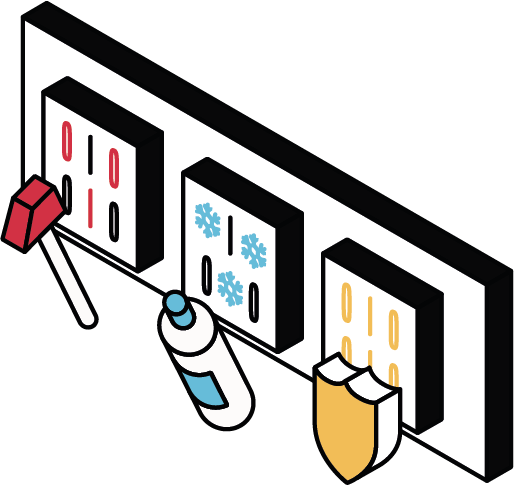
First DRAMSec Workshop
(DRAMSec 2021)
DRAM is the most prevalent memory technology used in laptops, mobile phones, workstations and servers. As such, its security is paramount, yet DRAM attacks remain as viable as ever despite many attempts to resolve its security problems: as an example, recent work has shown that modern DRAM remains vulnerable to Rowhammer, and in fact, newer chips are even more vulnerable than older ones. DRAM is also plagued by additional forms of attack including side-channel, Denial-of-Service (DoS) and cold-boot attacks.
DRAM security defenses are now at an impasse: the research community’s proposals do not take the practical constraints of DRAM devices into consideration while the industry is adopting obscure and ineffective remedies. There are huge ongoing efforts in industry to design safer and more reliable DRAM. Unfortunately, most of these efforts receive little input from the academic community. The goal of this workshop is to bridge these communities and to seek contributions from both academia and industry on the broad topic of DRAM security.
Registration and workshop program
DRAMSec will be a virtual event, please register here. To attend DRAMSec, enter Oceanographic Room on the Virtual ISCA website that points to this link.
Here is the workshop schedule on June 17th and 18th depending on the timezone:
| Time CEST (17th) | Time EDT (17th) | Time KST (18th) | Topic |
| 22:00 - 22:05 | 4:00 - 4:05 pm | 5:00 - 5:05 am | Welcome by chairs |
| 22:05 - 22:50 | 4:05 - 4:50 pm | 5:05 - 5:50 am | Paper presentations |
| 23:00 - 23:50 | 5:00 - 5:50 pm | 6:00 - 6:50 am | Keynote |
| 00:00 - 00:50 | 6:00 - 6:50 pm | 7:00 - 7:50 am | Panel |
Workshop papers
MAD: Memory Allocation meets Software Diversity
Manuel Wiesinger, Daniel Dorfmeister, and Stefan Brunthaler
Paper, Slides, Video
Panopticon: A Complete In-DRAM Rowhammer Mitigation
Tanj Bennett, Stefan Saroiu, Alec Wolman, and Lucian Cojocar
Paper, Slides, Video
Rethinking ECC in the Era of Row-Hammer (Invited Paper)
Moinuddin Qureshi
Paper, Slides, Video
Keynote
Getting Hammered: The Bleak Future of Rowhammer Research
Herbert Bos
Vrije Universiteit Amsterdam
More information about the keynote can be found here.
Panel
Is Rowhammer here to stay?
Barbara Aichinger
FuturePlus Systems
Kuljit Bains
Intel
Daniel Genkin
University of Michigan
Taek Woon Kim
Samsung Electronics
Onur Mutlu
ETH Zürich
More information about the panelists can be found here.
Workshop chairs
- Kaveh Razavi, ETH Zürich
- Stefan Saroiu, Microsoft
Program committee
- Tanj Bennett, Poratbo LLC
- Lucian Cojocar, Microsoft Research
- Anders Fogh, Intel
- Pietro Frigo, VU Amsterdam
- Daniel Genkin, University of Michigan
- Daniel Gruss, TU Graz
- Yoongu Kim, Google
- Kijun Lee, Samsung
- Clementine Maurice, CNRS
- Onur Mutlu, ETH Zürich
- Dong Pan, Micron
- Moinuddin K. Qureshi, Georgia Tech
- Mark Seaborn, Google
- Victor van der Veen, Qualcomm
- Yuval Yarom, University of Adelaide
- Yinqian Zhang, SUSTech
